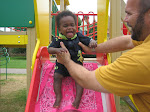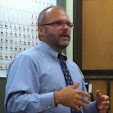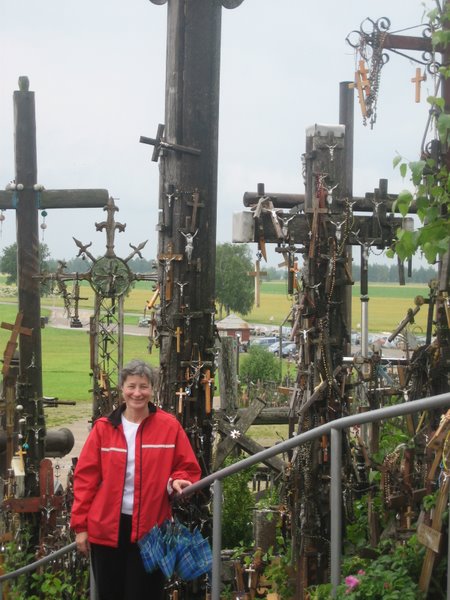Like MacArthur, I do not want to join the culture wars on the current terms. For me, this aversion stems partly from the fact that the discussion tempts us to do things like look backward to how great things were in earlier times. We ought to know, as a matter of theology, that people in earlier times had no better and/or enduringly godly grip on their own lives and times. This clip from the Johnny Otis show points this out. Before singing his hit "Willy and the Hand Jive" (so this would be the late 1950s), the announcer reminds us that Metropolitan Ford is open late every night, "including Saturdays and Sundays, until at least 11." If we were to take any measure of "keeping the sabbath" as refraining from commerce, then I guess we have improved over that period, as I don't know of a car dealership anywhere that stays open until 11 PM on Sunday.
This puts me in mind of a piece, on a similar topic, that I never finished....
The American cultural Left is responsible for September 11. So claims Dinesh D’Souza, the political conservative that evangelicals delight to embrace, in one of his recent books, The Enemy at Home. Without the likes of Michael Moore, Bill Moyers and Noam Chomsky there would have been no terrorist attack 7years ago, he says. As appealing as such thinking might seem, the analytical weakness of the book is—or should be—more of a spiritual wake-up call to self-professed “conservative” Christians, and less affirmation of the Left’s culpability and the Right’s exoneration. Indeed, D’Souza’s own logic and reasoning are so weak as to raise doubt not only about his thesis but also about the degree to which agreement with his argument is a mere commitment of ideology.
Therein rests the challenge to Christians. If D’Souza’s claims are logically unfounded and empirically unsubstantiated, then we need to reject the idea that undergirds those claims. And in this case, the argument clears the right (and the evangelical Christians who typically reside there) of responsibility in the matter of the terrorist attacks against the United States. He has made his claim in such a way that if we reject his arguments, we are come face to face with our own culpability, not for the terrorist attacks, but for the irresolute practice that results from weak faith.
D’Souza’s thesis goes something like this: The moral values of the American cultural Left—transmitted by Hollywood, the media, and the Democratic party’s political program—are anathema to the more conservative or traditional values of much of the rest of the world’s population. In the nature of the case, of course, we affront the Islamic world to our greatest peril. The American Left’s embrace of narcissism, from perverse sexual and family values to wanton disregard of moral norms in entertainment, particularly angers this more pious segment of the world’s society (in one interview, D’Souza put this group at 80% of the world’s population). Programs to freely distribute means of birth control to unwed women and girls, for instance, are the kind of imposition of sexual norms that abominate and corrode their societies. The anger—let’s call the intense distaste for the Western individualist values and lifestyle the “Muslim disgust”—stemming from this effrontery motivates jihadists and terrorists to make the desperate attacks they have and do.
Appealing reasoning, I have to admit, in great part because it lets me off the hook. Unfortunately, the dominant historical patterns defy the claim. If D’Souza is correct, we obviously have to look to that decade that conservatives and evangelicals love to despise—the 1960s—as the beginning of the problem. It was in this tumultuous 10 years (and especially the last half) that individualism began its descent into the libertine, where ungodly behavior of every sort was not only undertaken, but began to be accepted. Certainly, serious Christians look on this period with varying mixtures of shock and disappointment.
But the Muslim disgust starts before this American advent of Sodom and Gomorrah. It goes back at least 15 years earlier, to those glorious days to which supposedly so many conservatives, if not Christians, yearn to return. Sayyid Qutb was a Muslim scholar from Egypt who visited the United States in 1948. Shortly before the trip, Qutb had made an earnest commitment to Muslim belief, and the whole of his stay in America reinforced his devotion to the Prophet and his loathing of America and Western mores. He was apparently alarmed by how much freedom men granted women. Moreover, he called American churches, “entertainment centers and sexual playgrounds,” in part because he witnessed the discomforting scene of a Sunday afternoon dance in the basement of a church building.
After two and a half years of first-hand witness of American society, he returned to Egypt in 1951, and promptly joined the fundamentalist Muslim Brotherhood. After over 10 years of imprisonment by Nasser, he was executed in 1966, but not before he wrote what has since become the foundational doctrine for much of the Islamic world’s violent actions.
In Milestones, he summarizes Western weakness succinctly. “Even the Western world realizes that Western civilization is unable to present any healthy values for the guidance of mankind. It knows that it does not possess anything which will satisfy its own conscience and justify its existence….”
Most importantly, this abject failure of the West allows Qutb to elevate Islam over Western culture (including Christianity) and thereby begin the justification of violence against the infidel West. Again, in Milestones, he writes,
It is essential for mankind to have a new leadership....
It is necessary for the new leadership to preserve and develop the material fruits of the creative genius of Europe, and also to provide mankind with such high ideals and values as have so far remained undiscovered by mankind, and which will also acquaint humanity with a way of life which is harmonious with human nature, which is positive and constructive, and which is practicable.
Islam is the only system which possesses these values and this way of life.
Most scholars and analysts agree that Qutb’s thinking had a profound impact on, among many others, the resistance fighters in Afghanistan in the 1980s, one of whom was Osama bin Laden. Indeed, a recent US Army’s recent paper (sorry, I forget the title) lists Qutb as one of the primary philosophical sources on which contemporary jihadists rely.
D’Souza speaks words that reflect this understanding of Qutbist thinking in bin Laden’s own rhetoric, but he misses the point in his own words. Speaking to the National Review, D’Souza said,
In bin Laden’s Letter to America, issued shortly after 9/11, he said that America is the fount of global atheism and it is imposing its morally depraved values on the world. So Muslims must rise up in defensive jihad against America because their religion and their values are under attack. This aspect of Bin Laden’s critique has been totally ignored, and it’s one that resonates with a lot of traditional Muslims and traditional people around the world.
Convenience encourages us to replace “America” with “cultural Left,” but prudence demands that we examine what the jihadists think “America” is, and who represents it. More importantly, the requirement of spiritual reflection compels us to examine the degree to which we in the church are, in fact, guilty of spiritual flaccidity in our hearts and behavior. The crucial point is that to the Qutbist Islamists, America and Americans—not the cultural Left—are decadent, corrupt and unfaithful. Noam Chomsky and Jerry Falwell; Bill Moyers and Bill Buckley; Michael Moore and Mel Gibson are indistinguishable.
Several trenchant assessments of The Enemy at Home seem to have missed this point. In his National Review critique, Stanley Kurtz makes the very same observation about the earlier sources of the Muslim disgust, but he fails to draw the difficult conclusions. Rather than confront the ways that Islamist doctrine views America and Americans as the problem, he uses this evidence to claim that Islam really is in a battle with Modernity. This Modernity, of course, rests on a foundation of materialism, individualism, rationalism and ultimately secularism. All but materialism are, or course, highly celebrated by most Americans, left and right, but each one—not to mention the whole package—is badly suited to supporting a church of any serious faith.
Kurtz’s is an uncomfortably accurate observation, and one the church ignores to its spiritual peril. The American life offers delights too numerous to mention (I always understand that more clearly when I am abroad), and they are tempting. Lust, intemperate speech, and greed are hallmarks of selfish individualism that thrive in American society, even within the church. One doesn’t have to look far to see scantily-clad women, for instance. And such displays are indeed offensive to devout Muslims, as they should be to devout Christians. But which is more corrupt and corrupting before God—the Sports Illustrated swimsuit issue, or a supposedly devout pastor who neglects to address pornography use among his congregants? Or take the pop culture as represented by the reality TV shows such as American Idol. Surely, these represent the kind of intellectual and moral bankruptcy that traditionalists around the world decry. But the By Faith web site recently encouraged the denominational members to pray for an Idol contestant who was a member of the PCA body.
And just in case we might be tempted to say that 1948 isn’t really all that much earlier than 1968, this kind of general concern about what America is and stands for goes back as far as the founding of the republic. Indeed, as Robert Kagan, a former Reagan Administration official and neo-conservative luminary, points out in his recent book, Dangerous Nation, the forces of tradition were anxious about the United States and its values from the founding of the republic.
David Brooks, the politically conservative columnist, seconds Kagan. In a trenchant piece called Among the Bourgeoisophobes, he asserts that Europeans (and more recently, Muslims) have loathed Americans (and Jews, for that matter) because they are successful, in a material sense. Americans elevate commercial, rather than intellectual, prowess to the highest rung on the social and philosophical ladder. We then misunderstand, these critics claim, the richer and truer philosophical meanings of life.
All this to say that we would do well to examine ourselves and our faith, with a deep historical perspective. American society (as embodied in both the Declaration and the Constitution) was certainly established on political and philosophical foundations of individualism and self-maximization. It is not terribly surprising, given the weakness of both the human heart and flesh, that more than 200 years later, we have arrived where we are today.
So…don’t blame it on Chomsky or Michael Moore, as much as on ourselves.?
Tuesday, July 15, 2008
Subscribe to:
Post Comments (Atom)





No comments:
Post a Comment